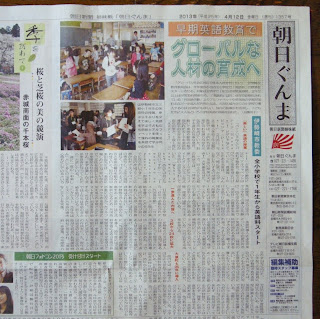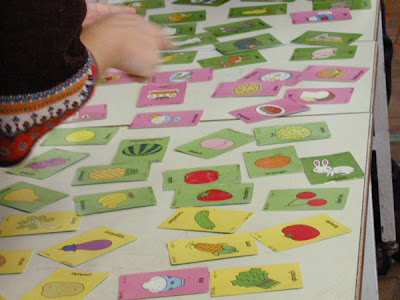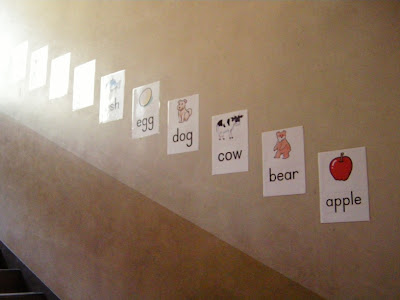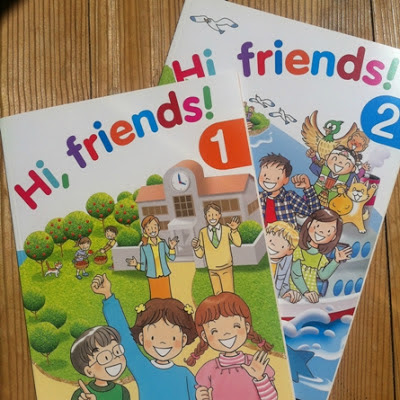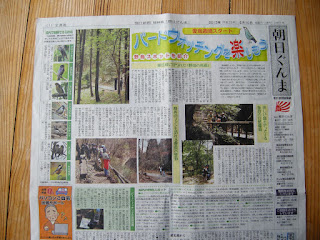Back in March, I visited an elementary school in Isesaki-city, Gunma to see its English class.
From 2011, English became a compulsory class for 5th and 6th grader in all public elementary schools in Japan. More precisely, once-a-week lesson called “Foreign Language Activities”: it’s not a usual subject like math or science and it doesn’t require tests or proficiency check.
Isesaki-city’s “English” class is somewhat more advanced than this. It’s considered as a proper subject, meaning there’re tests, and starts from 1st grade. Some schools in Isesaki-city have been giving English class for several years by now to figure out what works best for students. And after confirming its effectiveness, the city decided to give a go to all the schools in the area from this April.
The school I visited had been selected as research school and has given English class to all grades for 4 years. I was luckily allowed to see their 1st grade and 5th grade’s lessons…
1st grade: A lesson was given by a class teacher and an assistant English teacher (Japanese). In their 50min class, they were singing several English songs along DVDs and checking how to say names of vegetables and animals in English with picture cards. They didn’t use alphabet and there was no grammatical explanation. They remember songs and words by associating sound and gesture/picture. (For example, they were doing cute little gesture of skiing while they sung “I like skiing”… and stripping-a-banana gesture while saying “banana”.)
They were super excited from the beginning till the end, and what amazed me the most was that their pronunciation were exact copy of DVD’s or teachers… they have good hearing. (for some of them “Tuesday” sounds like Japanese “chu-shi-te” which is a cute way of saying ‘kiss me’, and they run after teachers every time they hear “Tuesday”. That was cute…)
5th grade: A lesson was given by a class teacher and an ALT (Assistant Language Teacher, who is usually coming from English speaking country or whose mother tongue is English. After they sung English song with CD, they were wrapping up the topic of “What do you want to be?” that they’re learning for several weeks. Each student has his or her dream job written in English on paper, and they interviewed each other with the phrase of “What do you want to be?” “I want to be a …. Because I like…” They write down alphabet by copying textbook, but they are not forced to remember the spelling. Again, there’s no grammar explanation.
They were calmer than 1st grade (naturally) but the class teacher told me afterwards that students are always excited in English class compare to other class. And btw, their top 3 dream job were baseball player, soccer player and game creator (almost same number, and it’s for boys. Girls’ varied.)
Both “Foreign Language Activities” and “English” class in Japanese public elementary school don’t teach English grammar or spelling. Because the purpose of these lessons is not to build up students English skill but to get familiar with English sounds and expression, and ultimately, to improve their communication skill in general.
As you know, there are quite a lot of arguments for and against early English education (when their first language is something other than English, of course..) It’s a constant discussion of “It’ll be effective and easier to learn” vs “It’ll negatively affect kids’ first language skill”.
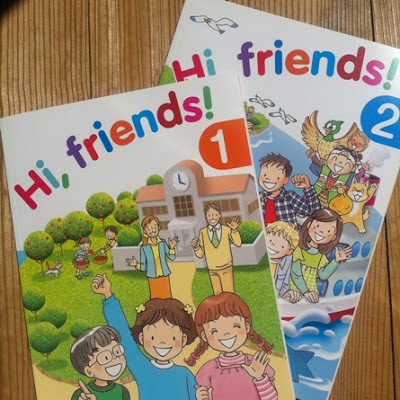
It’s not a official textbook, but this book are widely used in elementary school English class. So many pictures inside.
Before seeing the actual class, I also wondered if children get confused by the new language while they are still in the process of learning the basics of their mother tongue..
Based on what I’ve seen and the fact that it’s only given once a week, I felt that it won’t affect their first language. And rather than “English”, I find the class is close to “Music” lesson. It was an introduction to new language, and to a new way of self-expression.
I don’t know if early English education is actually good or bad, however the bright side of this is that they can approach it without being bothered by grammar and spelling: they have enough time to play with English rhythm before diving into “Subject+Verb+Objective” world. (Before the English became compulsory subject, English started from 7th grade.) It is only natural that some will find it interesting and some will hate it no matter how they’re taught. But at least they have equal chance to get to know this language in early age and I think that’s a big advantage… (you know, drawing, music, PE… if kids find it interesting through school class, they can pursue more.. Finding what they can love would be very helpful for them to get going… I guess..)
Like any other non-English-speaking country (especially in Asian countries), English language education is heating up in order to “keep up with globalism”. Yes, English is very handy tool to communicate with people from different countries, but personally I find current extreme trend in Japan like “must speak English fluently like a native speaker” or “talk in English even with your Japanese co-workers” is just too much…
Some are very good at expressing themselves other than language like in fashion, music, dancing and many other forms… and I believe, and as far as I’ve seen, cultivating what they are good at is the key to the world.. (and if language is the only issue, we can always ask for interpreter… ) just use your weapon…
For more information around English lesson in Japanese elementary school, there’s detailed article in here (Japan Times).

Here’s… the drawings I used for teaching practice at univ. Reaction from students were “we know how to say dog and cat in English, but we don’t know what this animal is”… fond memories..
Here’s… the drawings I used for teaching practice at univ. Reaction from students were “we know how to say dog and cat in English, but we don’t know what this animal is”… fond memories..
On a personal note, I discovered English at a quite early age. I forgot exactly when and how, but I clearly remember that I was strongly attracted by its very musical sound and rhythm. (and I really wanted to know what these people were talking..) I grew up in Gunma which is not really an international city, and back then English schools were not as popular as now (and it’s extremely rare to see “gaijin-san (foreigner)”) and I remember it was very hard to find a way to learn it.. 🙂 So to me, the fact that kids now have a chance to learn English once a week makes me droolingly jealous 😀 (I almost jumped to join the class.. as a student… it was fun.)
I know I tend to get bored easily but oddly interest for English language stays with me ever since I discovered. It taught me so much and certainly opened so many doors to me, but ironically or not, I also learned from it that language difference is not the highest wall between people… 🙂
I know I tend to get bored easily but oddly interest for English language stays with me ever since I discovered. It taught me so much and certainly opened so many doors to me, but ironically or not, I also learned from it that language difference is not the highest wall between people… 🙂


